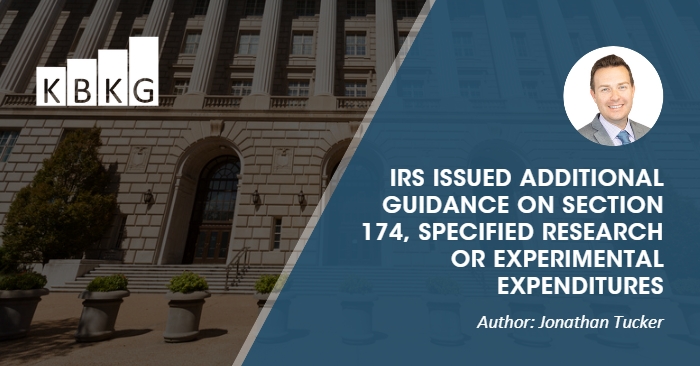This article has been updated from its original posting on Dec. 15, 2022.
The Treasury Department and Internal Revenue Service (IRS) issued Revenue Procedure 2023-11 providing updated guidelines for accounting method changes for the treatment of specified research or experimental expenditures under Section 174 that changed with the Tax Cuts and Jobs Act of 2017 (TCJA). This supersedes Revenue Procedure 2023-08 which was issued in December of 2022. Revenue Procedure 2023-11 modified Revenue Procedure 2023-08 to limit audit protection on the treatment of expenditures under Section 174. Audit protection will not apply to Section 174 expenditures if the accounting method change is made in the tax year subsequent to the tax year in which the Section 174 changes under the TCJA are made effective. This IRS update may impact taxpayers claiming the R&D Tax Credit on a move forward basis. Here’s what you need to know.
For the first taxable year in which the new Section 174 provisions apply, specified research and experimental expenditures paid or incurred in taxable year beginning after December 31, 2021, a taxpayer’s method of accounting must be made on a cut-off basis, meaning there is no “catch-up” Section 481(a) adjustment for prior Section 174 expenditures. Typically, to comply with any changes in an accounting method, a taxpayer must file a Form 3115, Application for Change in Accounting Method. This new guidance, however, allows taxpayers to comply with the new Section 174 provisions by filing a statement with the taxpayer’s original Federal income tax return for the first taxable year in which the new Section 174 provisions apply. After the first taxable year in which the new Section 174 provisions apply, taxpayers will be required to file a Form 3115, Application for Change in Accounting Method, with a modified Section 481(a) adjustment, to comply with the new Section 174 provisions.
In conclusion, the revised procedures provided by Rev. Proc. 2023-11 make the transition to the new Section 174 changes easier and provide taxpayers with the guidance they need to make the necessary changes, however limitations on audit protection may apply.
Our experts can help navigate these changes as businesses determine eligibility for R&D Tax Credits. Contact us today to get started.
Related Articles
- KBKG Tax Insight: Tax Court Denies Construction Company R&D Credits
- An Introduction to the Reverse Plea to the U.S. Senate and House of Representatives to Extend Section 174
- Inflation Reduction Act Expands Payroll Tax Credit Benefits for Small Businesses
About the Author
Jonathan Tucker – Principal

Southeast
Jonathan Tucker is based in Atlanta, GA, and has over 18 years of experience providing federal business tax advisory services, primarily in R&D tax credits and fixed asset/cost segregation reviews, to clients in various industries including technology, manufacturing, transportation, healthcare, retail and consumer products, hospitality, media and entertainment, financial, and other professional services industries. » Full Bio


